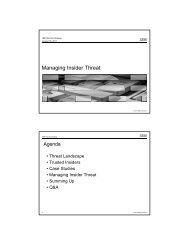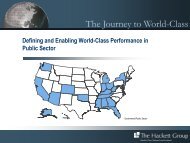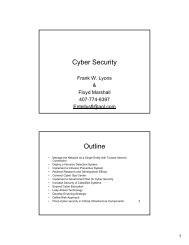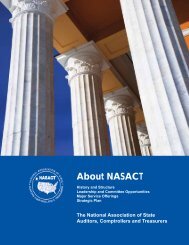Advisory Committee on Tax Exempt and Government Entities (ACT ...
Advisory Committee on Tax Exempt and Government Entities (ACT ...
Advisory Committee on Tax Exempt and Government Entities (ACT ...
Create successful ePaper yourself
Turn your PDF publications into a flip-book with our unique Google optimized e-Paper software.
The Appropriate Role Of The Internal Revenue Service With Respect To <strong>Tax</strong>-<strong>Exempt</strong> Organizati<strong>on</strong> Good Governance Issues<strong>and</strong> federal powers stated that “it is for us [the states] to decide.” 59 That regulator alsoremarked: “People <strong>on</strong> the ground know who is doing what within their jurisdicti<strong>on</strong>,something that is not readily available to a nati<strong>on</strong>al organizati<strong>on</strong>.” 60 Former <strong>and</strong> currentstate regulators interviewed for this report expressed hesitati<strong>on</strong> about unintendedc<strong>on</strong>sequences that may occur when governance matters are raised through questi<strong>on</strong>s<strong>on</strong> federal forms such as the Form 990 or Form 1023, particularly when the subjects ofthose inquiries are not tied to explicit authority in the Internal Revenue Code but, rather,are intended to “drive behavior” toward generally accepted indicators of goodgovernance. To the extent that the more active states with more developed n<strong>on</strong>profitlaws already have a comprehensive framework in place articulating governanceexpectati<strong>on</strong>s, these regulators note a risk that the necessarily more diluted federalarticulati<strong>on</strong>, <strong>on</strong>e that has been crafted for nati<strong>on</strong>al c<strong>on</strong>sumpti<strong>on</strong>, will stop short of thosemore vigorous state norms. 61We believe that the primacy of state law in matters of n<strong>on</strong>profit governance (other thanwith respect to the tax code) remains unassailable, <strong>and</strong> that, <strong>on</strong> the merits, the statesare better positi<strong>on</strong>ed than the IRS to regulate n<strong>on</strong>profit governance in a manner that isboth sensitive to the diversity of <strong>and</strong> experimentati<strong>on</strong> in the sector <strong>and</strong> meaningful in thelegal remedies that are available to correct governance failures. After decades ofinadequate state funding for charities enforcement, <strong>and</strong> with the interstate reach of anincreasing number of charities, however, an exp<strong>and</strong>ed IRS role in this area isunsurprising. Moreover, as states have become more cognizant of their resp<strong>on</strong>sibility tosupervise the administrati<strong>on</strong> of charitable assets—<strong>and</strong> without a pervasive soluti<strong>on</strong> tothe endemic lack of resources for that effort in many states—we generally found anacceptance of an increased role for the IRS has emerged am<strong>on</strong>g state regulators.Thus, while we believe the IRS needs to tread carefully to ensure that it does not usurpthe primacy of the states, <strong>and</strong> that it respects diversity <strong>and</strong> experimentati<strong>on</strong>, we do notbelieve that the historically dominant role of the states is a bar to greater IRSinvolvement in governance.C. Models Outside Of Federal <strong>and</strong> State Regulati<strong>on</strong>sIn additi<strong>on</strong> to the regulati<strong>on</strong>s of federal <strong>and</strong> state entities, there is a c<strong>on</strong>tinuum of selfregulatorymodels within the n<strong>on</strong>profit sector ranging from systems of accreditati<strong>on</strong> thatcarry the force of law <strong>and</strong> sancti<strong>on</strong>s for violati<strong>on</strong> to st<strong>and</strong>ards that can be adopted byn<strong>on</strong>profit organizati<strong>on</strong>s <strong>on</strong> a voluntary basis, without external verificati<strong>on</strong>. In betweenthese two extremes are st<strong>and</strong>ards that members of an associati<strong>on</strong> or network of similarorganizati<strong>on</strong>s may be required to adopt in order to benefit from membership in the59A representative from a state attorney general’s office in a discussi<strong>on</strong> with <strong>ACT</strong> members, October 4, 2007.60Id.61Offering a phrase that arose in other c<strong>on</strong>texts, <strong>on</strong>e former regulator interviewed for this report observed that, in matters ofgovernance: “One size does not fit all.” While that observati<strong>on</strong> was also made by others interviewed for this report in reference tothe need to distinguish am<strong>on</strong>g diverse organizati<strong>on</strong>s, here it c<strong>on</strong>noted the pluralistic value of a federalist approach to the regulati<strong>on</strong>of governance.ADVISORY COMMITTEE ON TAX EXEMPT AND GOVERNMENT ENTITIES (<strong>ACT</strong>) June 11, 2008 21













